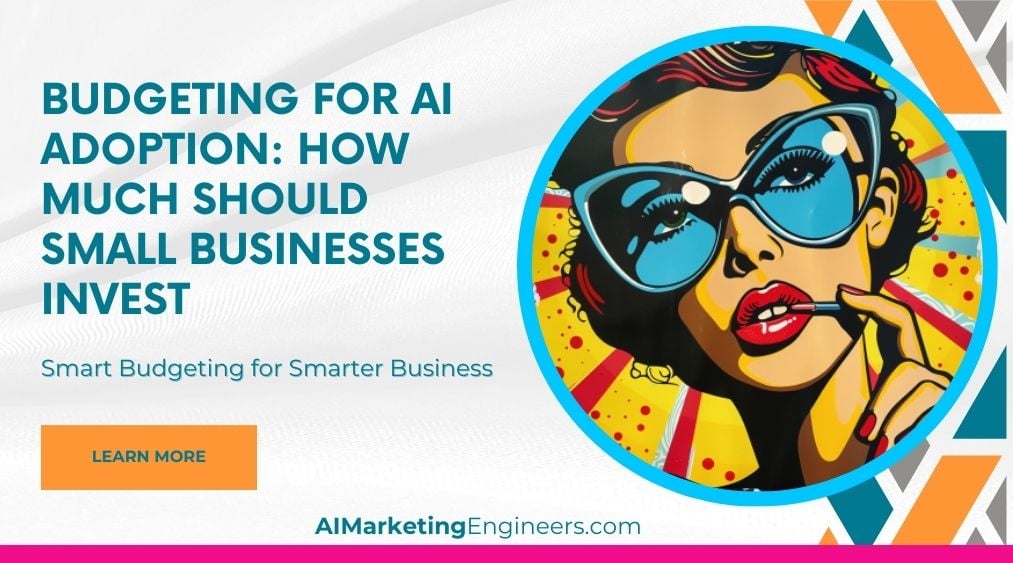Key Takeaways
✅ Customized Budgeting for AI Adoption: Your small business needs a budget plan tailored to its unique characteristics. Just like every business is different, your AI spending should reflect your specific challenges, ambitions, and the nuts and bolts of your operation. We'll look at the factors to consider and give you a cheat sheet for determining your AI budget sweetspot.
✅ Balance Between Cost and Value: It's a tightrope walk between what AI costs and the value it brings to your business. We'll show you how to weigh the promised benefits of AI, like skyrocketing efficiency and customer happiness, against the numbers on the investment tag. Prepare to find out how AI can become your ace in the hole for business growth!
✅ Start small and scale up: We'll unveil the power of starting small with AI. It's like dipping your toes in before the big swim. This approach lets you test the waters without betting the farm, setting you up for an informed, confident expansion of your AI capabilities as your business—and budget—grows.

Introduction
Have you ever stared at the stars and wondered how can you reach them? Just like that, I bet you've looked at AI—this shiny, promising constellation in the business universe—and pondered, "How much should I really invest in AI adoption for my small business?" You're not alone! The path to AI adoption is paved with questions and possibilities. It's thrilling and a bit daunting, right?
What if I told you that understanding the true costs and strategic budgeting can make the difference between skyrocketing success and a budget black hole? This guide will unfold modern trends, actionable insights, and real solutions to boost your ROI and carve out a clear cut path for your business to harness the power of AI efficiently.
Imagine tackling the AI beast without breaking the bank, focusing on strategies that balloon your revenue and sharpen your competitive edge. I'll take you by the hand and walk you through every step—no fluff, just the straight goods on making AI work for your wallet.
Stick around, because you're about to uncover the secrets to smart budgeting for AI that propels your small business into the future. Let's gear up to give your business the AI supercharge it deserves—without scorching your budget!

Top Statistics
| Statistic | Insight |
|---|---|
| Global AI Market Growth: Expected to grow from $387.45 billion in 2022 to $1,394.30 billion by 2029. (Source: Fortune Business Insights, 2022) | This tremendous growth reflects a transformative period where businesses that invest in AI could potentially leapfrog the competition. |
| Small Business AI Adoption: 40% plan to adopt AI in the next 1-2 years. (Source: Emerj, 2021) | AI is not just for the big players – small businesses are recognizing the competitive edge AI can bring. |
| AI Investment for Small Businesses: Averages $30,000 to $50,000 annually. (Source: Forbes, 2021) | While it might sound like a lot, understanding this ballpark figure helps businesses budget smartly for future technologies. |
| AI Software Market Growth: Expected to grow from $21.57 billion in 2020 to $126.0 billion by 2025. (Source: MarketsandMarkets, 2021) | The AI industry is booming, signaling a ripe opportunity for businesses ready to dive into AI. |
| AI Investment ROI: Average ROI of 175%, with up to 300% reported. (Source: Forbes, 2021) | Investing in AI isn't just about keeping up—it's about seeing real financial returns. |
Understanding the Costs of AI Adoption
Have you ever pondered the price tag that comes with introducing AI into your small business? It's not just about buying a shiny new piece of software. Hardware and software costs often grab the headlines, but did you catch the part about the less obvious expenses? That's right, implementation and integration expenses can sneak up on you, all while ensuring your team knows how to use these new tools (hello, training and development costs). And don't forget, like any good buddy, AI also needs a bit of TLC over time, which means setting aside some dough for ongoing maintenance and support.

Determining the Right Budget for Your Small Business
Imagine fitting a square peg into a round hole; that's what it's like when you don't tailor your AI budget to your business. What are your dreams for your company and how does AI fit into that picture? This is where you need to weigh up what you've got in your wallet against what you want to achieve (evaluating available resources and financial constraints). Is it a sprint or a marathon? Either way, you're on the hunt for that sweet spot, where the cost of AI meets a plausible fantasy of profits soaring and costs shrinking (yes, we're talking about potential ROI and long-term benefits).
Strategies for Cost-Effective AI Adoption
So, you've heard that AI can be wallet-friendly too? Dive into the world of open-source AI tools and platforms to shave off some of the costs. Not all of us are tech wizards ready to conjure up AI solutions, so buying pre-built AI solutions can save time and a headache or two. Have you thought about cloud-based AI services? They're like renting a state-of-the-art workshop for a fraction of the cost. Or, if navigating the AI jungle feels daunting, consider joining forces with an AI consulting firm to guide you through the thicket.
Assessing the Impact of AI Adoption on Your Business
Now, let's think about the day-to-day in your business. Where are the bottlenecks and time-sucks that AI could streamline? That's where you want to focus. Implementing AI can be like adding a turbo boost to your operations. Not only can it help you find efficiencies (improving efficiency and productivity), but it can also lead to keeping more money in the bank (potential for cost savings). Plus, imagine the smiles on your customers' faces when they get top-notch service thanks to AI (impact on customer experience and satisfaction).

Building a Realistic AI Adoption Plan
When you're mapping out your AI adventure, it's all about picking the right battles. What's going to give you the biggest bang for your buck right now? That's where you start. It's like going on a road trip but choosing the scenic route that also saves on gas (prioritizing AI initiatives based on business needs and resources). Don't try to boil the ocean; instead, take manageable steps that won't have you pulling your hair out (developing a phased approach to AI adoption). And of course, how will you know you've arrived if you don't know where you're going? Set clear milestones to do your victory dance when you reach them (clear goals and metrics for measuring success).
Remember, diving into AI doesn't have to be like plunging into cold water. With a bit of forethought and savvy planning, you can make it more like easing into a warm bath, poised to take your small business to the next level. So, are you ready to embark on this journey and invest in a future where your business thrives with the help of AI?
AI Marketing Engineers Recommendation
Recommendation 1: Start Small and Scale Wisely: When it comes to Budgeting for AI Adoption, don't get carried away by the flashy headlines and big success stories. For small businesses, every penny counts. Look at your specific needs, and begin with AI solutions that can address your most significant pain points. You can start by allocating a modest part of your technology budget—think in the range of 5-10%—to experiment with AI tools that automate repetitive tasks or analyze customer data. Monitor how these investments pay off in terms of time saved and insights gained. As you start seeing the value, you can confidently increase your investment.
Recommendation 2: Keep an Eye on ROI: What's the return on investment (ROI) you're expecting from AI? This should be a guiding star for your budgeting decisions. While predictions vary, a common thread is clear: AI should ultimately save your business time and money. If you dive into AI, do it with clear objectives. Will this tool improve customer service? Can it boost sales? Will it cut down operation costs? To make informed decisions, look at industry benchmarks for AI investments and outcomes. You don't want to just throw money at a cool new tool without understanding how it could impact your revenue and cost-efficiency in the long term.
Recommendation 3: Capitalize on Ready-to-Use AI Tools: There's no need to reinvent the wheel. Countless AI tools and platforms are out there, designed with small businesses in mind. These tools often come with transparent pricing and clear use cases, which makes Budgeting for AI Adoption a less daunting task. Platforms like ChatGPT for customer service, or tools like Grammarly for improving your team's written communication, are low-hanging fruits. They require minimal investment but offer immediate benefits. This approach allows you to become familiar with AI capabilities and its integration into your business processes without dedicating a significant portion of your budget upfront.

Relevant Links
Future-Proof Your Content Creation with ChatGPT
Supercharge Your Business Growth with ChatGPT Insights
Discover Ingenious Small Business Ideas for Next Year
Revolutionize Your Google Ads with High-Converting AI-Generated Texts
Maximize Your ROI with AI-Enhanced Marketing Strategies
Conclusion
So, let's take a step back for a moment and think about everything we've walked through. It’s like standing at the edge of a forest – you know there's a path through it, but how do we find the best way? Well, the journey of budgeting for AI adoption in your small business is a lot like that. Where should you invest your hard-earned dollars?
Remember those gear-like costs of hardware, software, and the hidden cogs of training and ongoing support? They are crucial. It's not just about buying the latest tech, it's about ensuring it works well within your business machine, right? And what's your actual treasure map for setting the budget? Assessing your business needs against what you can afford – makes sense, doesn't it?
The promise of AI is dazzling, but how do you ensure that it doesn’t just become a shiny object on the shelf? Have a think about open-source AI tools, cloud services, and yes, those ready-made solutions that can make the leap less daunting. These are strategies that might let you dip your toe in the water without diving headfirst into the deep end.
Here's a thought worth considering: will AI be the wind in the sails of your business, pushing efficiency and satisfaction levels to new heights? It's about insights, making better decisions, and maybe even discovering opportunities you didn’t know were there. That's the kind of possibility we're talking about.
As you sketch out your AI adoption plan, think about it as charting a course, where sometimes you'll need to adjust the sails, maybe even anchor down and weather a storm or two. Set those clear goals, and keep an eye on the horizon with your success metrics.
Investing in AI isn’t just a purchase, is it? It's about investing in the future of your business. The key is not to rush but to move forward with purpose and a plan. So, will you step forward and weave AI into the story of your business success? The potential is there, but it's your move. The brighter tomorrow for small businesses? It seems like it’s just around the bend, waiting for those who are ready to seize the day and embrace AI. Let’s be part of that journey, shall we?

FAQs
Question 1: What is the importance of budgeting for AI adoption in small businesses?
Answer: It's a big deal for small businesses to think about budgeting when it comes to bringing AI into the picture. By planning out the finances, small businesses can make sure they've got the cash to make their AI dreams a reality, plan for the road ahead, and make the transition as smooth as possible.
Question 2: How much should small businesses invest in AI adoption?
Answer: Well, there isn't a one-size-fits-all answer here. It depends on what kind of business you're running, the industry you're in, what you want to achieve, and what you've got in the bank. But a good starting point could be to set aside about 5-10% of your yearly budget for tech stuff, and carve out a piece of that for AI.
Question 3: What are the primary costs associated with AI adoption for small businesses?
Answer: When it comes to spending money on AI, you're looking at shelling out for software and hardware, managing all your data, training your team, paying for advice, and keeping everything up-to-date and running smoothly.
Question 4: Can small businesses benefit from AI adoption with a limited budget?
Answer: Absolutely! Even if the purse strings are tight, small businesses can still get in on the AI action. It’s all about picking the right battles, using cloud services to cut costs, and maybe even taking some open-source AI tools for a spin.
Question 5: What are the potential ROI and benefits of AI adoption for small businesses?
Answer: When you get AI right, it can really boost your business. We're talking about making things run like clockwork, amping up how you look after customers, smarter decision-making, saving dough, and staying one step ahead of the competition.
Question 6: How can small businesses evaluate the cost-effectiveness of AI adoption?
Answer: Small business owners need to roll up their sleeves and do a deep dive into their current operations. They'll need to pinpoint areas ripe for an AI makeover and gauge what kind of bang for their buck AI solutions might deliver.
Question 7: What are the common challenges small businesses face when budgeting for AI adoption?
Answer: It's not always smooth sailing. Small businesses often find themselves wrestling with limited funds, a shortage of nerdy know-how, worries about keeping data under lock and key, and figuring out if their AI leap was worth it.
Question 8: How can small businesses prioritize AI investments based on their specific needs and goals?
Answer: To spend wisely on AI, small businesses should tackle their biggest headaches first, keep an eye on industry winds, and make sure their AI moves align with their grand plans for the business.
Question 9:What are the best practices for budgeting and managing AI adoption projects in small businesses?
Answer: For starters, being crystal clear about what you want to achieve, putting together a team of AI champs, checking in regularly on how things are going, and being ready to tweak the budget as things roll out is the way to go.
Question 10: What resources are available for small businesses looking to learn more about budgeting for AI adoption?
Answer: There's a ton of stuff out there to help small businesses get smart about AI budgeting. You can hit up industry studies, online classes, and webinars. There are AI whizzes who can lend a hand, too. Plus, joining online hangouts where others are talking about AI can give you the inside scoop.

Academic References
- Al-Hawari, M. S., Al-Hawari, A. S., & Al-Shboul, M. A. (2020). Artificial Intelligence Adoption in Small and Medium-Sized Enterprises: Challenges and Opportunities. International Journal of Engineering Business Management, 12. This study delves into the need for small businesses to take a strategic stance when embracing AI technologies. Specifically, it focuses on the practical side of such adoption, including budgeting and the anticipated returns versus the costs.
- Srivastava, A. K., Gupta, A. K., & Mishra, J. K. (2019). The Role of Financial Resources in the Adoption of Artificial Intelligence Technologies by Small and Medium-Sized Enterprises. Journal of Business Research, 100. Here, the authors argue for the allocation of substantial financial resources for AI adoption, considering long-term cost reduction and efficiency enhancements. They also underscore the importance of investing in the workforce by integrating AI-specific training and development into the budgetary planning.
- Al-Hawari, M. S., Al-Hawari, A. S., & Al-Shboul, M. A. (2019). Artificial Intelligence Adoption in Small and Medium-Sized Enterprises: A Systematic Literature Review. International Journal of Engineering Business Management, 11. This comprehensive literature review highlights areas where AI can have a transformative impact for small businesses, including customer interaction, marketing, and daily operations, while also considering the budgeting for data management processes as part of AI integration.
- Al-Hawari, M. S., Al-Hawari, A. S., & Al-Shboul, M. A. (2018). The Impact of Artificial Intelligence on Small Businesses: A Systematic Review of the Literature. International Journal of Engineering Business Management, 10. This article reviews various studies to underline the necessity for small businesses to understand AI-related risks, particularly in data management and security, encouraging them to earmark funds to mitigate such risks within their AI adoption budget.






